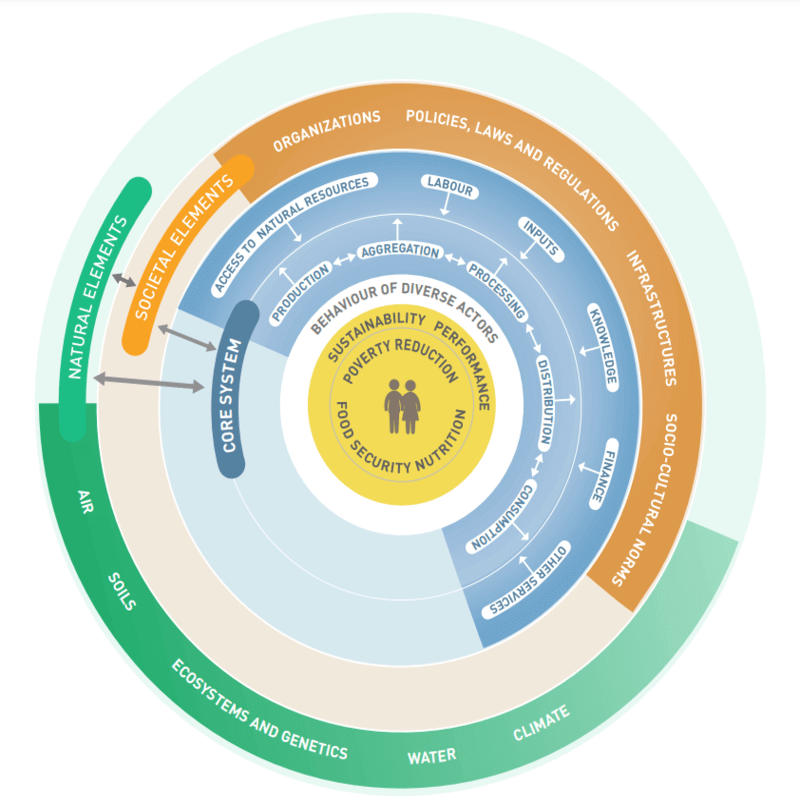
Given the increasing food demand, environmental degradation, and the challenges posed by climate change, there is an urgent need to transform agri-food systems into sustainable enterprises through scientific innovations. Read here to understand how sustainable agri-food systems can be fostered.
Food systems encompass the entire range of actors and their interlinked value-adding activities involved in the production, aggregation, processing, distribution, consumption, and disposal of food products that originate from agriculture, forestry, or fisheries, and parts of the broader economic, societal, and natural environments in which they are embedded.
The food system is composed of sub-systems (e.g., farming system, waste management system, input supply system, etc.) and interacts with other key systems (e.g. energy system, trade system, health system, etc.).
Therefore, a structural change in the food system might originate from a change in another system; for example, a policy promoting more biofuel in the energy system will have a significant impact on the food system.
Sustainable agri-food systems

Sustainable agri-food systems refer to a holistic approach to agriculture and food production that aims to meet the needs of the present while preserving the ability of future generations to meet their own needs.
These systems are designed to be environmentally, economically, and socially sustainable.
Environmental Sustainability:
- Conservation of Resources: Sustainable agriculture aims to minimize the use of non-renewable resources like fossil fuels and synthetic chemicals while maximizing the efficient use of renewable resources like water and soil.
- Biodiversity: The preservation of biodiversity is essential. Sustainable systems promote crop rotation, agroforestry, and the preservation of natural habitats to support diverse ecosystems.
- Reduced Environmental Impact: Sustainable agriculture seeks to minimize environmental impacts, such as soil erosion, water pollution, and greenhouse gas emissions, associated with farming practices.
Economic Sustainability:
- Economic Viability: Farmers and agricultural businesses should be economically viable, able to earn a living, and maintain financial stability.
- Market Access: Access to markets and fair pricing for agricultural products is essential for economic sustainability.
- Value Addition: Adding value to agricultural products through processing and marketing can enhance the economic sustainability of agri-food systems.
Social Sustainability:
- Labor Conditions: Providing fair wages and decent working conditions for agricultural workers is a fundamental aspect of social sustainability.
- Community Well-Being: Sustainable agriculture benefits local communities by creating job opportunities, supporting local economies, and fostering a sense of community well-being.
- Access to Healthy Food: Ensuring that all members of society have access to safe, nutritious, and affordable food is a social sustainability goal.
Why sustainable agri-food systems?

A food system must be considered in the context of rapid population growth, urbanization, growing wealth, changing consumption patterns, and globalization as well as climate change and the depletion of natural resources.
The developments in food systems have yielded many positive results, especially over the past three decades in developing countries.
These results include the expansion of off-farm employment opportunities as food industries have developed, and the widening of food choices beyond local staples, thus satisfying consumers’ preferences in terms of taste, form, and quality.
Food Security and Nutrition:
- Sustainable agri-food systems prioritize food security by aiming to produce a sufficient and consistent supply of food to meet the population’s nutritional needs.
- Nutrient-dense and diverse food production is promoted to address nutritional deficiencies and improve overall health.
Resilience:
- Building resilience in agri-food systems involves practices and policies that help agriculture withstand and recover from shocks such as extreme weather events, pests, and diseases.
Technology and Innovation:
- Sustainable systems incorporate innovative technologies that improve resource use efficiency, reduce waste, and enhance agricultural productivity.
Reduced Waste and Loss: Sustainable agri-food systems seek to reduce food waste and loss at various stages of production, distribution, and consumption.
Local and Organic Farming: Supporting local and organic farming practices is often a key element of sustainable agri-food systems, as they tend to have lower environmental impacts and promote healthier food.
Knowledge Transfer: Sustainable agriculture involves the transfer of knowledge and best practices to farmers and stakeholders to improve the sustainability of farming techniques.
Policy and Regulation: Governments play a critical role in shaping sustainable agri-food systems through policies and regulations that support responsible and sustainable practices.
Consumer Awareness and Demand: Consumer choices can drive the sustainability of agri-food systems by supporting products and practices that align with their values and sustainability goals.
Global Collaboration: Many sustainability challenges in agri-food systems are global. Collaboration among countries and international organizations is crucial to address issues such as climate change, trade, and food security.
Limitations of current approaches
The complexity of food systems requires a more holistic and coordinated approach. Many food security and nutrition challenges are complex problems whose solutions are contested and which transcend disciplinary, divisional, and institutional boundaries.
- In increasingly globalized food systems, these challenges result from interactions across different scales and levels. They require integrated actions taken by all stakeholders at local, national, regional, and global levels, by both public and private actors, and across multiple fronts- not only in agriculture, but also trade, policy, health, environment, gender norms, education, transport and infrastructure, and so on.
- It requires a synergetic merging rather than a destructive clashing of the ideas emerging from these various angles.
- Traditional food security programs tend to adopt a production-focused approach, which seeks to directly influence food security through increasing the supply of food.
- In a few regions of the world, particularly Sub-Saharan Africa, inadequate food production is still the major cause of food and nutrition insecurity.
However, the dramatic pace of food system changes over the past decades has brought about complex interactions and feedback loops that impact food security and nutrition in many different ways.
- The focus on food production leads to the neglect of other areas in which the root causes of the food system’s underperformance, as well as the leverage points to bring about the biggest impacts, can often be found.
- Furthermore, the interwoven interactions and feedback in the food system mean that direct interventions in one area risk creating or exacerbating problems in another.
India and sustainability of food-agri systems
India has been working towards transforming agri-food systems into sustainable enterprises through scientific innovations. But there are still more aspects to be cared for.
- Agricultural scientists should strive to infuse greater mechanization in the agriculture production process and develop and popularise specialized farm implements for women in agriculture.
- The Sagar Parkirama drive shed more light on marine and inland water pollution that has seriously affected aquatic life and coastal ecology.
- Traditional farm products such as pokkali rice need to be promoted and measures are to be taken to ensure profitability for the pokkali farmers.
- Minimising post-harvest losses is equivalent to boosting production and this can be achieved by focusing attention on advanced technological interventions.
The future of India’s agriculture depends a lot on how the accumulated scientific knowledge can be translated to commercial success.
Conclusion
Sustainable agri-food systems are about achieving a balance between economic prosperity, social equity, and environmental responsibility in agriculture and food production. These systems seek to ensure that agriculture not only provides for today’s needs but also preserves resources for future generations while promoting health, equity, and resilience.
Related Articles:
- Green Agriculture
- Blue Food
- Agroforestry
- Organic Farming
- Agri-food policies for Soil, water, air, and biodiversity
-Article by Swathi Satish






Leave a Reply